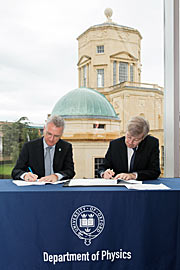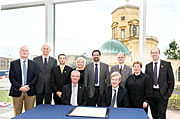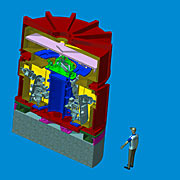Mitteilung
Vereinbarung für HARMONI am E-ELT unterzeichnet
23. September 2015
Die ESO hat eine Vereinbarung mit einem internationalen Konsortium von Instituten [1] für die Planung und Konstruktion von HARMONI unterzeichnet, einem Instrument für das European Extremely Large Telescope (E-ELT).
Die Vereinbarung wurde am 22. September 2015 von Grahame Blair, dem Exekutivdirektor des Rates für Programme, wissenschaftliche und technologische Einrichtungen, für das Konsortium und von Tim de Zeeuw, dem Generaldirektor der ESO, bei einer Zeremonie am mathematischen Institut an der Universität Oxford (UK) unterzeichnet.
Patrick Roche, der Präsident des ESO-Councils, und Niranjan Thatte, der HARMONI-Projektleiter, waren ebenfalls anwesend.
HARMONI (High Angular Resolution Monolithic Optical and Near-infrared Integral field spectrograph) wird eines der Instrumente sein, die bereits beim First Light des riesigen Teleskops installiert sein werden. Das Instrument wird als Arbeitspferd für den sichtbaren und nah-infraroten Spektralbereich von 0,5-2,4 µm dienen. Es kann sowohl zusammen mit verschiedenen Systemen für die adaptive Optik als auch ohne solche Systeme betrieben werden und wird die Kamera MICADO ergänzen, die vor allem als bildgebendes Instrument eingesetzt werden wird.
HARMONI ist ein Integralfeld-Spektrograf, mit dem gleichzeitig mehr als 30.000 Spektren eines astronomischen Objekts im nahinfraroten und sichtbaren Wellenlängenbereich aufgenommen werden können. Das Design des Instruments ist so ausgelegt, dass es einfach zu kalibrieren und bedienen ist. Das E-ELT ist also mit einem Instrument für spektroskopische Schnappschüsse ausgestattet, weshalb das große wissenschaftliche Potential des Teleskops bereits zu Beginn ausgeschöpft werden kann.
Dank der enorm hohen Lichtsammelleistung und räumlichen Auflösung des E-ELT mit sienen 39 Metern Durchmesser wird HARMONI in der Lage sein, Galaxien des frühen Universums zu erforschen, die Bestandteile des lokalen Universums zu untersuchen und Exoplaneten sehr detailliert zu charakterisieren. Die Vielseitigkeit des Instruments zeigt sich in der Breite der möglichen Bildgrößen, Auflösungsleistungen, Sichtfeldern und Wellenlängenbereichen. So lässt sich beispielsweise eine hohe spektrale Auflösung bei hellen Objekten oder eine hohe Sensitivität bei lichtschwachen, entfernten Objekten erzielen.
HARMONI ist das Resultat jahrelanger, umfangreicher Entwicklungsarbeit sowohl bei der ESO als auch der astronomischen Gemeinschaft. Insbesondere zu Beginn der Entwicklung wurden die Studien von Sandro D'Odorico (ESO) angestoßen. Mit HARMONI wird die etablierte Tradition der Integralfeld-Spektroskopie mit adaptiven optischen Systemen im nah-infraroten (SINFONI) und sichtbaren (MUSE) Bereich am VLT fortgeführt.
Fußoten
[1] Das HARMONI-Konsortium setzt sich aus der Universität Oxford (UK), dem UK Astronomy Technology Centre (Großbritannien), dem Centre de Recherche Astrophysique de Lyon (Frankreich), dem Laboratoire d'Astrophysique de Marseille (Frankreich), dem Instituto de Astrofísica de Canarias (Spanien) und dem Centro de Astrobiologia (CSIC - INTA) (Spanien) zusammen.
Links
- HARMONI-Webseite der ESO
- Informationen über HARMONI (Oxford)
- detaillierte Beschreibung des Instruments
Kontaktinformationen
Niranjan Thatte
Principal Investigator of HARMONI
University of Oxford, United Kingdom
E-Mail: thatte@astro.ox.ac.uk
Joël Vernet
ESO Project Scientist
ESO
Garching bei München
Tel: +49 89 3200 6579
E-Mail: jvernet@eso.org
Richard Hook
ESO Public Information Officer
Garching bei München
Tel: +49 89 3200 6655
Mobil: +49 151 1537 3591
E-Mail: rhook@eso.org
Lucy Stone
Deputy Media Manager
Science and Technology Facilities Council
Rutherford Appleton Laboratory, Didcot, Großbritannien
Tel. +44 1235 445052
E-Mail: lucy.stone@stfc.ac.uk
Über die Mitteilung
| ID: | ann15070 |
Our use of Cookies
We use cookies that are essential for accessing our websites and using our services. We also use cookies to analyse, measure and improve our websites’ performance, to enable content sharing via social media and to display media content hosted on third-party platforms.
ESO Cookies Policy
The European Organisation for Astronomical Research in the Southern Hemisphere (ESO) is the pre-eminent intergovernmental science and technology organisation in astronomy. It carries out an ambitious programme focused on the design, construction and operation of powerful ground-based observing facilities for astronomy.
This Cookies Policy is intended to provide clarity by outlining the cookies used on the ESO public websites, their functions, the options you have for controlling them, and the ways you can contact us for additional details.
What are cookies?
Cookies are small pieces of data stored on your device by websites you visit. They serve various purposes, such as remembering login credentials and preferences and enhance your browsing experience.
Categories of cookies we use
Essential cookies (always active): These cookies are strictly necessary for the proper functioning of our website. Without these cookies, the website cannot operate correctly, and certain services, such as logging in or accessing secure areas, may not be available; because they are essential for the website’s operation, they cannot be disabled.
Functional Cookies: These cookies enhance your browsing experience by enabling additional features and personalization, such as remembering your preferences and settings. While not strictly necessary for the website to function, they improve usability and convenience; these cookies are only placed if you provide your consent.
Analytics cookies: These cookies collect information about how visitors interact with our website, such as which pages are visited most often and how users navigate the site. This data helps us improve website performance, optimize content, and enhance the user experience; these cookies are only placed if you provide your consent. We use the following analytics cookies.
Matomo Cookies:
This website uses Matomo (formerly Piwik), an open source software which enables the statistical analysis of website visits. Matomo uses cookies (text files) which are saved on your computer and which allow us to analyze how you use our website. The website user information generated by the cookies will only be saved on the servers of our IT Department. We use this information to analyze www.eso.org visits and to prepare reports on website activities. These data will not be disclosed to third parties.
On behalf of ESO, Matomo will use this information for the purpose of evaluating your use of the website, compiling reports on website activity and providing other services relating to website activity and internet usage.
Matomo cookies settings:
Additional Third-party cookies on ESO websites: some of our pages display content from external providers, e.g. YouTube.
Such third-party services are outside of ESO control and may, at any time, change their terms of service, use of cookies, etc.
YouTube: Some videos on the ESO website are embedded from ESO’s official YouTube channel. We have enabled YouTube’s privacy-enhanced mode, meaning that no cookies are set unless the user actively clicks on the video to play it. Additionally, in this mode, YouTube does not store any personally identifiable cookie data for embedded video playbacks. For more details, please refer to YouTube’s embedding videos information page.
Cookies can also be classified based on the following elements.
Regarding the domain, there are:
- First-party cookies, set by the website you are currently visiting. They are stored by the same domain that you are browsing and are used to enhance your experience on that site;
- Third-party cookies, set by a domain other than the one you are currently visiting.
As for their duration, cookies can be:
- Browser-session cookies, which are deleted when the user closes the browser;
- Stored cookies, which stay on the user's device for a predetermined period of time.
How to manage cookies
Cookie settings: You can modify your cookie choices for the ESO webpages at any time by clicking on the link Cookie settings at the bottom of any page.
In your browser: If you wish to delete cookies or instruct your browser to delete or block cookies by default, please visit the help pages of your browser:
Please be aware that if you delete or decline cookies, certain functionalities of our website may be not be available and your browsing experience may be affected.
You can set most browsers to prevent any cookies being placed on your device, but you may then have to manually adjust some preferences every time you visit a site/page. And some services and functionalities may not work properly at all (e.g. profile logging-in, shop check out).
Updates to the ESO Cookies Policy
The ESO Cookies Policy may be subject to future updates, which will be made available on this page.
Additional information
For any queries related to cookies, please contact: pdprATesoDOTorg.
As ESO public webpages are managed by our Department of Communication, your questions will be dealt with the support of the said Department.





